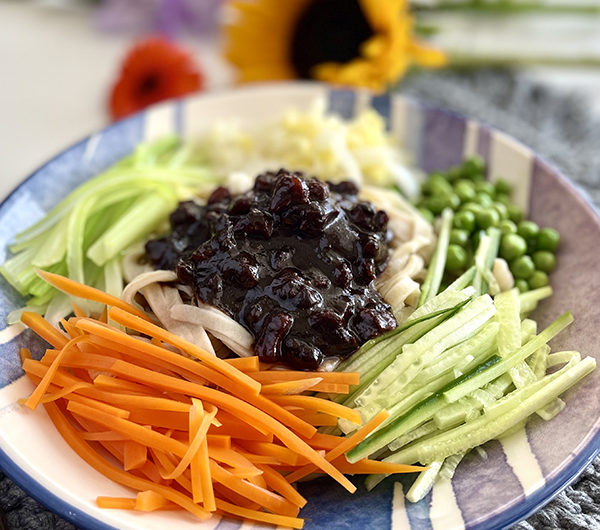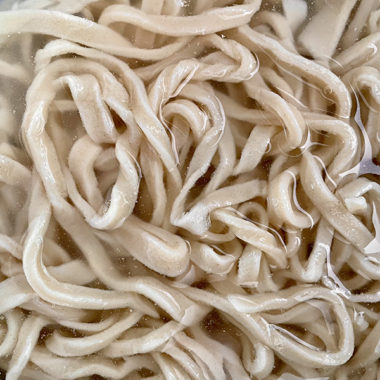As a northern Chinese, I can live without rice but not without noodles. One of the many things I really miss whenever I’m away from Beijing is a good bowl of Beijing Zhajiang noodles (老北京炸酱面 lǎo běi jīng zhà jiàng miàn).
There are many theories regarding where Beijing Zhajiang noodles came from. The most popular one is that it was discovered and brought back to Beijing from Xi’an by Empress Dowager Cixi when she and her royal family was on the run avoiding foreign invasion back in 1900. While we can never be sure of its origin, one thing is for sure, which is Beijing Zhajiang noodles became and still is one of the most popular dishes in Beijing.
Luckily, my Greek husband is as much of a noodles fan as I am. So, whenever I make Zhajiang noodles at home, we feast.
In this post, I am going to walk you through the process of making an authentic Beijing Zhajiang noodles dish.
Every self-respecting Zhajiang noodles dish has three parts: Zhajiang sauce (炸酱 zhà jiàng), vegetables (菜码 cài mǎ), and noodles (面 miàn).
This recipe walks you through how to make the sauce (炸酱 zhà jiàng), and the vegetables (菜码 cài mǎ) in this recipe together. I highly recommend pairing this sauce with handmade noodles!
Beijing Zhajiang(Bean Paste Sauce) Noodles
Course: NoodlesCuisine: ChineseDifficulty: Easy4
servings10
minutes15
minutesOur authentic Beijing Zhajiang noodles recipe will show you how to make this hearty northern Chinese favorite for any occasion.
Ingredients
- Sauce
Pork belly 500g
Red peppercorn 3g
Star anise 0.5g
Cinnamon stick half
Bay leaf 1 whole
Spring onion 1
Sweet Bean Paste 1 packet
Bean Paste 1 packet
Water 3 tbs
Sugar 20-25g
Shaoxing Cooking Rice Wine (optional)
- Vegetable garnish
Carrots 2 whole
Cucumber 1 whole
Chinese leaf
Celery 2-3 stalks
Directions
- Here are all the ingredients (the flour and egg are for the handmade noodles, I forgot to take them out when taking the picture…)
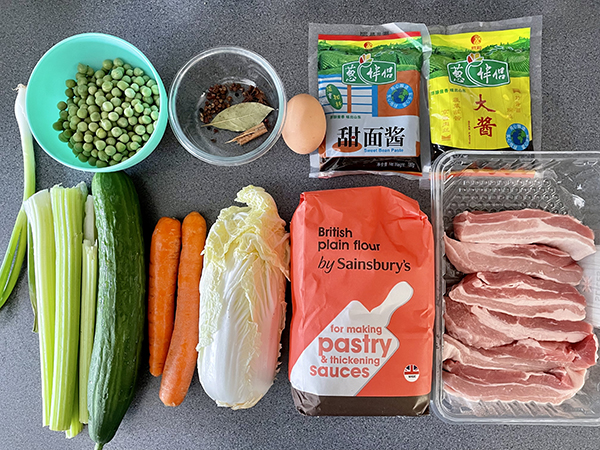
- This Shaoxing Wine is what I use when cooking the meat. If you don’t have it, feel free to replace it with another kind of cooking alcohol you can find in your local Chinese shop. Even if you can’t get some, it is fine. It’s not going to affect the taste too much as the bean paste is pretty strong when it comes to flavor. So, NOT the end of the world, keep going!
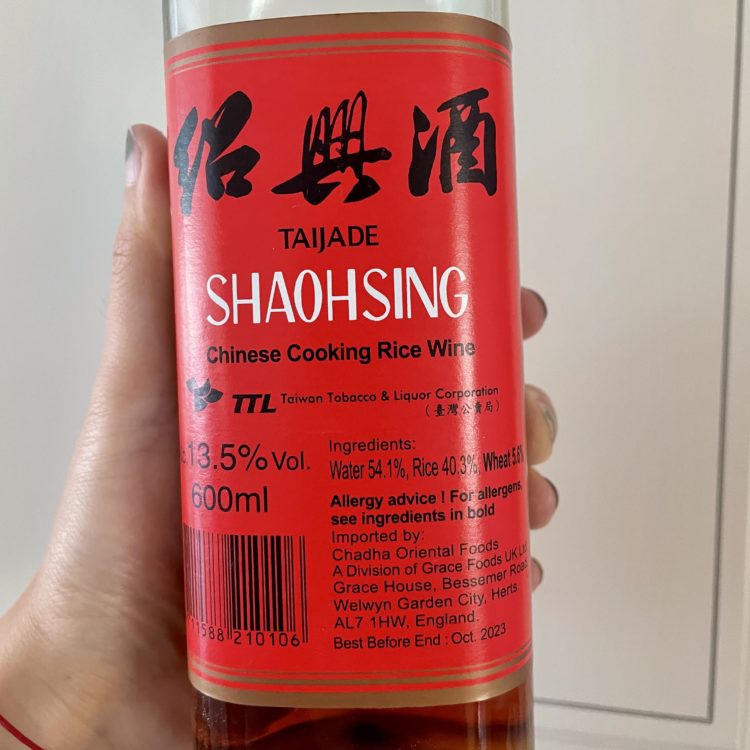
- Chop the spring onion into big chunks and put them together with red peppercorn, star anise, cinnamon stick, and bay leaf. These are the spices we need for the sauce.
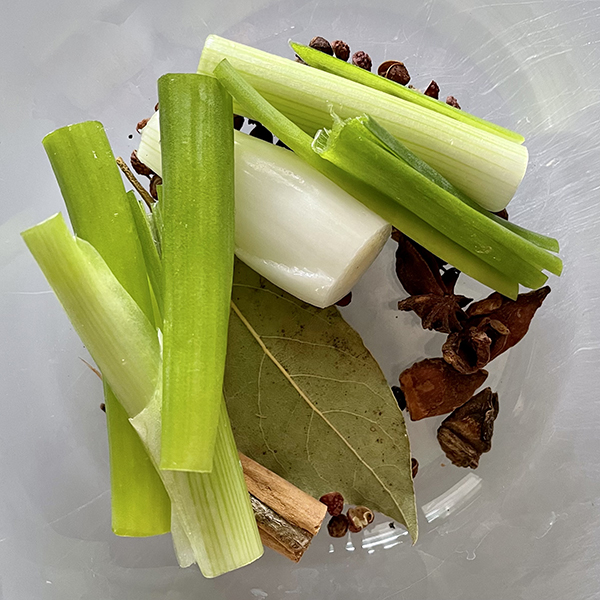
- Separate the fatty part of the pork belly from the lean part and cut them into small cubes. The perfect fat meat to lean meat ratio is 3:7.
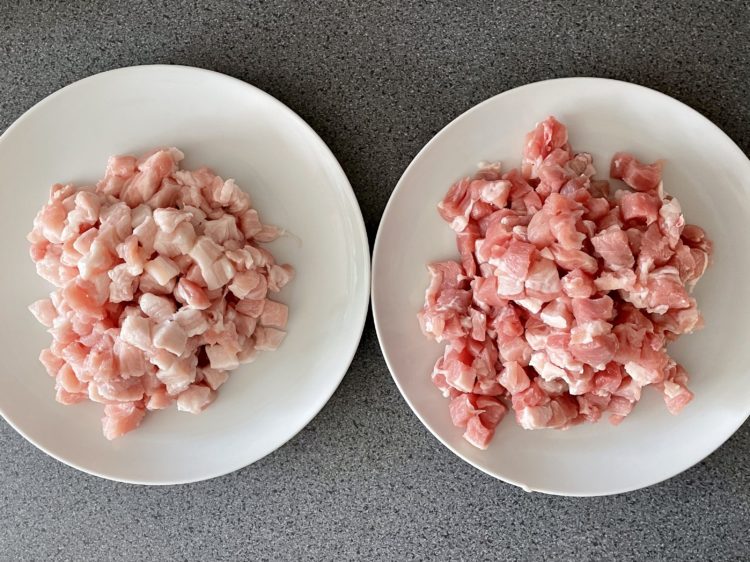
- Heat up a tablespoon of vegetable oil (or sunflower oil). Then, put the spices in, and let them cook for a few minutes on high heat.
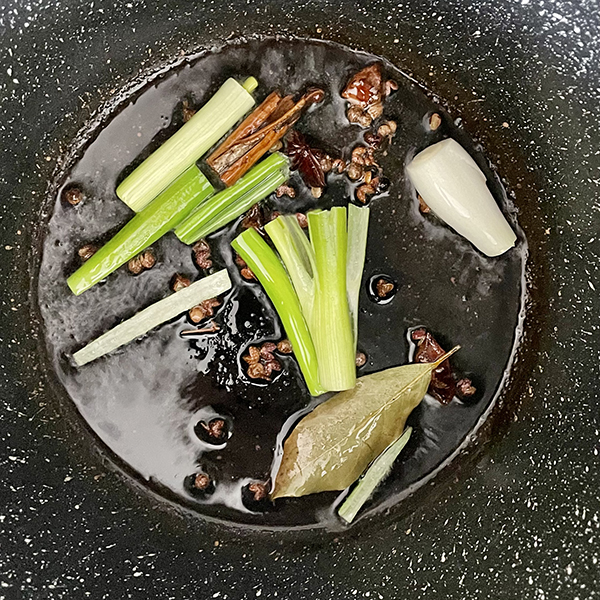
- The oil should have absorbed the flavors from the spices. Take them out when they are nicely browned as shown in the image below and make sure you leave the oil in.
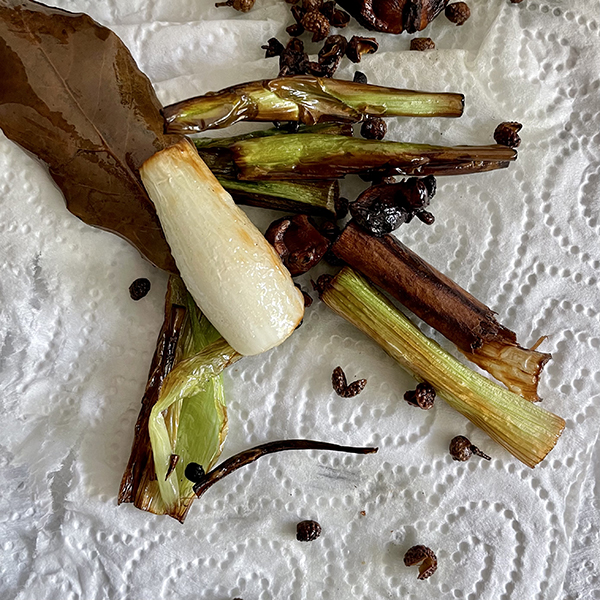
- Start by cooking the fatty portion of the pork belly first and let it cook until its oil is out.
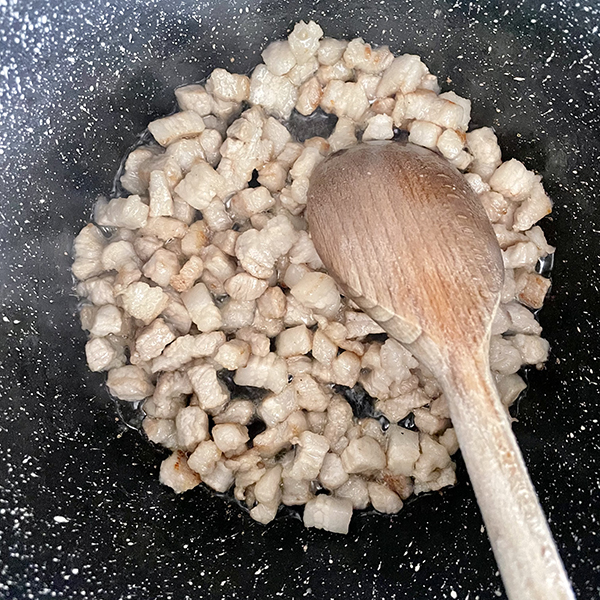
- Add the lean portion of the pork belly and let it cook thoroughly. Add 3 tablespoons of water and bring to a boil.
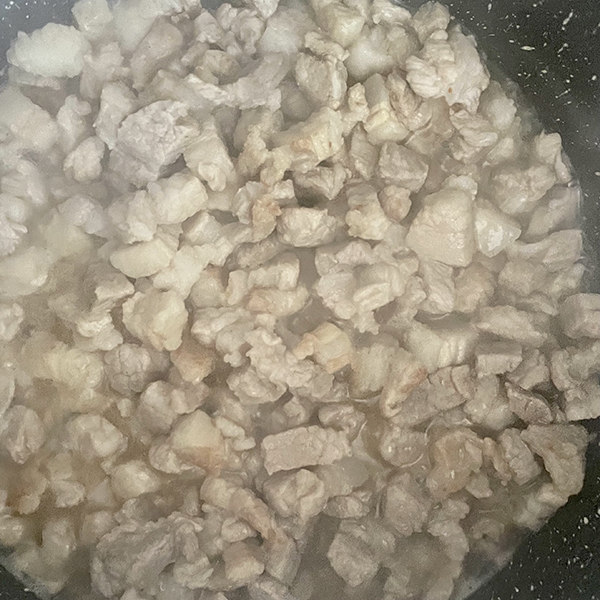
- Set the heat to low, put in the sweet bean paste and bean paste. Stir in one direction (Don’t ask me why, this is what I was told by my mom, and she by her mom. If you do feel naughty and want to stir all kinds of ways, do enjoy and let me know the result!). Add sugar to your taste. Let it all simmer for 4 minutes with the lid on and your sauce is ready.
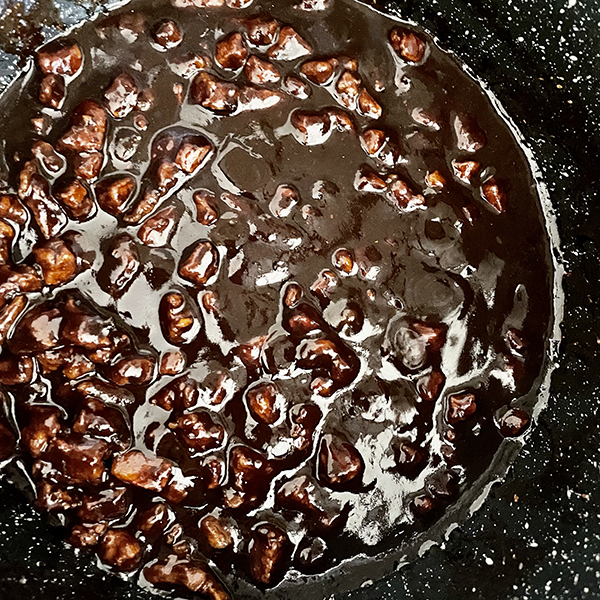
- Cut carrots, celery, Chinese leaf, and cucumber into fine strips. In a pot, bring water to a boil, put all the vegetables EXCEPT the cucumber in for 1-2 minutes. Run under cold water to cool, then plate them.
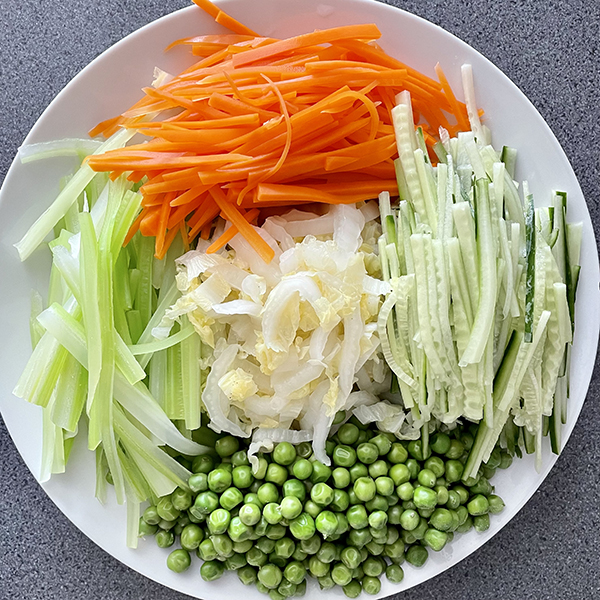
- Now, mix the noodles (面 miàn) of your choice (mine are handmade noodles), vegetables (菜码 cài mǎ) and Zhajiang sauce (炸酱 zhà jiàng) together. Personally, I like to add quite a bit of Chinese dark rice vinegar in the mix (proud northern Chinese). Also, some garlic goes really well with this dish (if you are a garlic lover like me ;p)
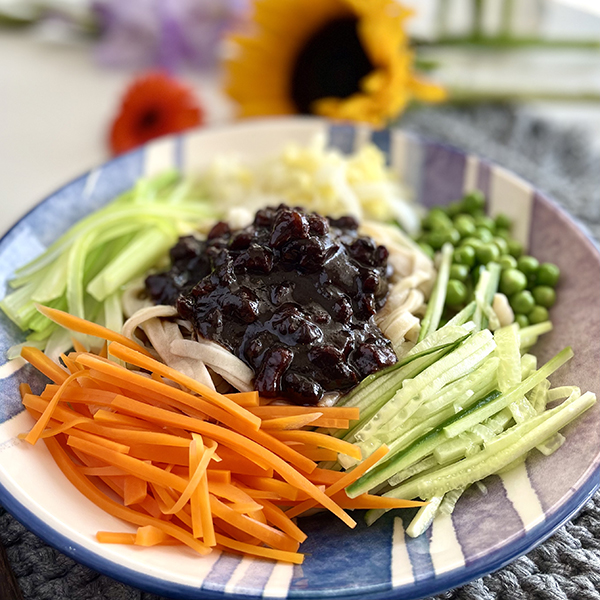
- Enjoy!
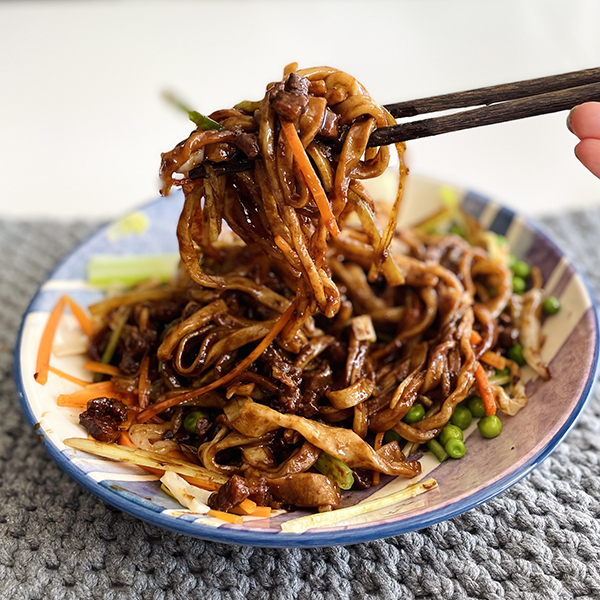
Variations
I prefer to have my Zhajiang sauce with freshly handmade noodles because of the chewy texture. You can check out our super chewy handmade noodles recipe to make your own.
However, when I do feel lazy and just want a quick Zhajiang noodles meal without too much effort, I find that fresh egg noodles from local supermarkets are a pretty good substitute. The next option would be packaged pasta, which I find makes for a hearty meal. For this reason, I like to make more sauce and store it in a jar in the fridge.
Try It Yourself!
Now you are armed with the knowledge to make your own tasty Zhajiang noodles! Have at it and let us know in the comments how it went. Feel free to drop any questions you might have as well and be sure to follow us on Instagram for more photos of delicious Chinese food.
